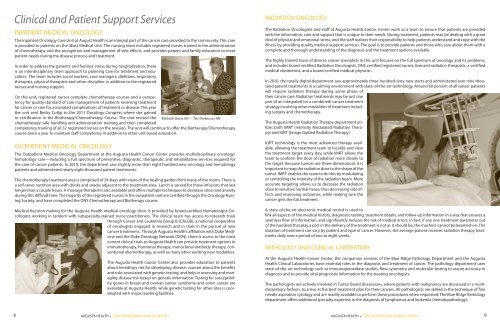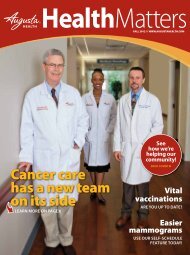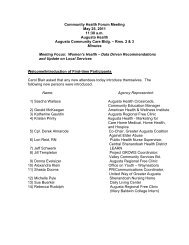2011 Cancer Program - Augusta Health
2011 Cancer Program - Augusta Health
2011 Cancer Program - Augusta Health
You also want an ePaper? Increase the reach of your titles
YUMPU automatically turns print PDFs into web optimized ePapers that Google loves.
Clinical and Patient Support Services<br />
INPATIENT MEDICAL ONCOLOGY<br />
The Inpatient Oncology Care Unit at August <strong>Health</strong> is an integral part of the cancer care provided to the community. This care<br />
is provided to patients on the 3East Medical Unit. The nursing team includes registered nurses trained in the administration<br />
of chemotherapy and the recognition and management of side eff ects, and provides patient and family education to meet<br />
patient needs during the disease process and treatment.<br />
In order to address the patients’ and families’ stress during hospitalization, there<br />
is an interdisciplinary team approach to planning care for treatment and education.<br />
The team includes social workers, case managers, dietitians, respiratory<br />
therapists, physical therapists and other discipline in addition to the registered<br />
nurses and nursing support.<br />
On this unit, registered nurses complete chemotherapy courses and a competency<br />
for quality standard of care management of patients receiving treatment<br />
for cancer or care for associated complications of treatment or disease. This year<br />
the unit sent Becky Cutlip to the <strong>2011</strong> Oncology Congress where she gained<br />
re-certifi cation in the Biotherapy/Chemotherapy Course. The unit revised the Michelle Davis, RN – Terri Perkinson, RN<br />
chemotherapy safe handling and administration training and then completed<br />
competency training of all 32 registered nurses on the revision. The unit will continue to off er the Biotherapy/Chemotherapy<br />
course twice a year to maintain staff competency in addition to other unit based education.<br />
OUTPATIENT MEDICAL ONCOLOGY<br />
The Outpatient Medical Oncology Department at the <strong>Augusta</strong> <strong>Health</strong> <strong>Cancer</strong> Center provides multidisciplinary oncology/<br />
hematology care—including a full spectrum of preventive, diagnostic, therapeutic and rehabilitative services required for<br />
the care of cancer patients. In 2010, the department saw slightly more than eight hundred new oncology and hematology<br />
patients and administered nearly eight thousand patient treatments.<br />
The chemotherapy treatment area is comprised of 24-bays with views of the healing garden from many of the rooms. There is<br />
a self-serve nutrition area with drinks and snacks adjacent to the treatment area. Lunch is served for those infusions that last<br />
longer than a couple hours. A massage therapist is also available and off ers multiple techniques to decrease stress and anxiety<br />
during this diffi cult time. The majority of the registered nurses in the outpatient unit are certifi ed through the Oncology Nursing<br />
Society, and have completed the ONS Chemotherapy and Biotherapy course.<br />
Medical decision-making for the <strong>Augusta</strong> <strong>Health</strong> medical oncology clinic is provided by board-certifi ed Hematologist-Oncologists<br />
working in tandem with subspecialty-trained nurse practitioners. The clinical team has access to research trials<br />
through <strong>Cancer</strong> and Leukemia Group B (CALGB), a national cooperative<br />
of oncologists engaged in research and in trials in the pursuit of new<br />
cancer treatments. Through <strong>Augusta</strong> <strong>Health</strong>’s affi liation with Duke Medicine<br />
and the Duke Oncology Network (DON), there is access to the most<br />
current clinical trials so <strong>Augusta</strong> <strong>Health</strong> can provide treatment options in<br />
immunotherapy, hormonal therapy, monoclonal antibody therapy, conventional<br />
chemotherapy, as well as many other exciting new modalities.<br />
8<br />
The <strong>Augusta</strong> <strong>Health</strong> <strong>Cancer</strong> Center also provides education to patients<br />
about hereditary risk for developing disease, counsel about the benefi ts<br />
and risks associated with genetic testing, and help in assessing and managing<br />
disease risk based on genetic information. Testing for susceptibility<br />
genes in breast and ovarian cancer syndrome and colon cancer are<br />
available at <strong>Augusta</strong> <strong>Health</strong>, while genetic testing for other sites is coordinated<br />
with major teaching facilities.<br />
RADIATION ONCOLOGY<br />
The Radiation Oncologists and staff at <strong>Augusta</strong> <strong>Health</strong> <strong>Cancer</strong> Center work as a team to ensure that patients are provided<br />
with the information, care and support that is unique to their needs. During treatment, patients may be dealing with a great<br />
deal of physical and emotional stress, and the staff realizes their responsibility to help patients understand and cope with the<br />
illness by providing quality medical support services. The goal is to provide patients and those who care about them with a<br />
complete and thorough understanding of the diagnosis and the treatment options available.<br />
The highly trained team of diverse cancer specialists in this unit focuses on the full spectrum of oncology and its problems,<br />
and includes board-certifi ed Radiation Oncologists, ONS certifi ed registered nurses, licensed radiation therapists, a certifi ed<br />
medical dosimetrist, and a board certifi ed medical physicist.<br />
In 2010, the totally digital department saw approximately three hundred-sixty new starts and administered over nine thousand<br />
patient treatments in a calming environment with state-of-the-art technology. Around 60 percent of all cancer patients<br />
will require radiation therapy during some phase of<br />
their cancer care. Radiation treatments may be just one<br />
part of an integrated (or a combined) cancer treatment<br />
strategy involving other modalities of treatment including<br />
surgery and chemotherapy.<br />
The <strong>Augusta</strong> <strong>Health</strong> Radiation Therapy department utilizes<br />
both IMRT (Intensity Modulated Radiation Therapy)<br />
and IGRT (Image Guided Radiation Therapy).<br />
IGRT technology is the most advanced therapy available,<br />
allowing the treatment team to localize and view<br />
the treatment target every day, while IMRT allows the<br />
team to conform the dose of radiation more closely to<br />
the target. Because tumors are three-dimensional, it is<br />
important to map the radiation dose to the shape of the<br />
tumor. IMRT enables the team to do this by modulating<br />
or controlling the intensity of the radiation beam. More<br />
accurate targeting allows us to decrease the radiation<br />
dose to sensitive normal tissue, thus decreasing side effects<br />
and improving outcomes, while making sure the<br />
cancer gets the full treatment.<br />
A state-of-the-art electronic medical record is used to<br />
link all aspects of the medical history, diagnostic testing, treatment details, and follow-up information in a way that ensures a<br />
seamless fl ow of information, and signifi cantly reduces the risk of medical errors. In fact, if any one treatment parameter out<br />
of the hundred that play a part in the delivery of the treatment is not as it should be, the machine cannot be beamed-on. The<br />
duration of treatment can vary by patient and type of cancer. However, the average patient receives radiation therapy treatments<br />
daily over a period of two to eight weeks.<br />
PATHOLOGY AND CLINICAL LABORATORY<br />
At the <strong>Augusta</strong> <strong>Health</strong> <strong>Cancer</strong> Center, the companion services of the Blue Ridge Pathology Department and the <strong>Augusta</strong><br />
<strong>Health</strong> Clinical Laboratories have essential roles in the diagnosis and treatment of cancer. The pathology department uses<br />
state-of-the-art technology such as immunoperoxidase studies, fl ow cytometry and molecular testing to assure accuracy in<br />
diagnosis and to provide vital prognostic information for the treating oncologists.<br />
The pathologists are actively involved in Tumor Board discussions, where patients with malignancy are discussed in a multidisciplinary<br />
fashion, to arrive at the best treatment plan for their cancers. All pathologists are skilled in the technique of fi ne<br />
needle aspiration cytology and are readily available to perform these procedures when requested. The Blue Ridge Pathology<br />
department off ers additional specialty expertise in the diagnosis of lymphomas and leukemia (hematopathology).<br />
AUGUSTA HEALTH • CANCER PROGRAM ANNUAL REPORT AUGUSTA HEALTH • CANCER PROGRAM ANNUAL REPORT<br />
9





